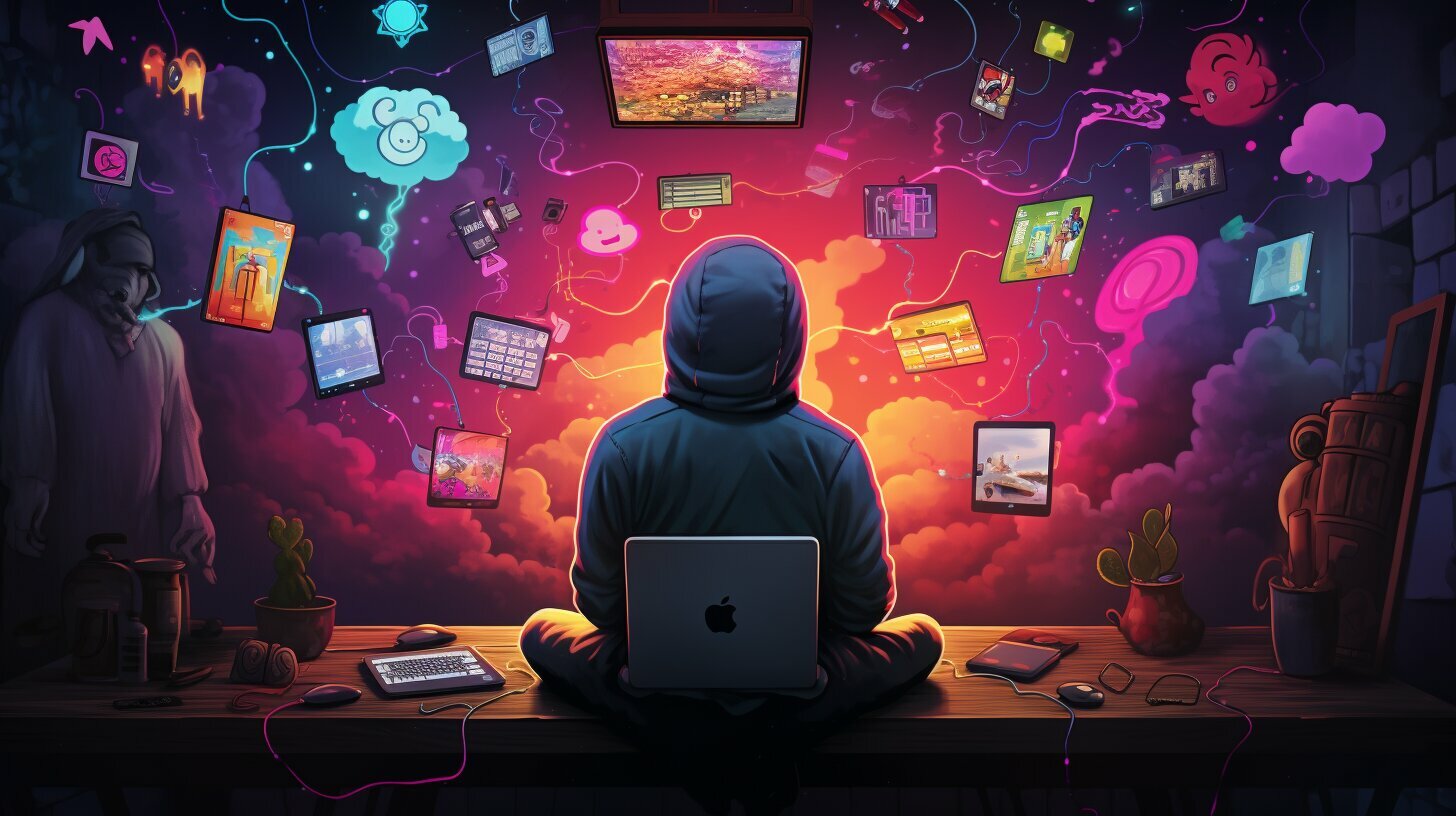The Impact of Social Media on Mindset and Mental Health
Social media has significantly impacted mindset and mental health, with studies showing a negative correlation between prolonged use of…

Social media has significantly impacted mindset and mental health, with studies showing a negative correlation between prolonged use of social networking sites and symptoms of depression and anxiety. The rapid rise of platforms such as Facebook has brought about various negative effects on individuals’ well-being. It is crucial to recognize the detrimental impact of social media and find a healthy balance in its usage.
Key Takeaways:
- Prolonged use of social media can be related to signs and symptoms of depression.
- Comparison and validation-seeking on social media can lead to low self-esteem and anxiety.
- Social media use is linked to decreased sleep quality, anxiety, depression, and physical ailments.
- Adolescents, especially females, are more vulnerable to negative effects of social media.
- Finding a healthy balance with social media is crucial for protecting mental health.
The Influence of Comparison and Validation-Seeking on Mindset
The prevalence of comparison and validation-seeking on social media platforms can have a detrimental impact on mindset, fostering feelings of inadequacy, low self-esteem, and anxiety. With the constant exposure to carefully curated and filtered content, individuals often find themselves comparing their own lives to the seemingly perfect lives of others, leading to a negative perception of their own accomplishments and self-worth.
Social media platforms create an environment where validation is sought through likes and comments. The quest for external validation can become addictive, as individuals become reliant on the approval of others to feel good about themselves. However, this validation-seeking behavior can be self-destructive, as it places one’s self-worth in the hands of others, leaving them vulnerable to feelings of inadequacy and low self-esteem when the desired validation is not received.
The impact of comparison and validation-seeking on mindset is not limited to adults; adolescents, in particular, are highly susceptible to its negative effects. For young girls, social media can exacerbate feelings of exclusion and inferiority, as they compare their bodies, appearances, and achievements to the idealized portrayals they see online. This can contribute to body image issues, lowered self-esteem, and a sense of vulnerability.
| Social Media Impact | Effect on Mindset |
|---|---|
| Comparison with others | Feelings of inadequacy |
| Validation-seeking | Low self-esteem |
| Exposure to idealized portrayals | Body image issues |
While it is important to recognize the negative impact of comparison and validation-seeking on mindset, it is equally crucial to find a healthy balance when using social media. Self-awareness and self-monitoring are key in evaluating the impact that social media has on mental health. Setting ground rules, such as limiting screen time and actively engaging in other activities, can help mitigate the negative effects. Conducting behavior experiments, where individuals consciously evaluate how their mindset is affected by social media use, can further inform their decision-making process.
In conclusion, the influence of comparison and validation-seeking on social media platforms can have a profound impact on mindset, fostering feelings of inadequacy, low self-esteem, and anxiety. It is important for individuals, especially adolescents and vulnerable groups, to be aware of these effects and take steps to protect their mental well-being. By finding a healthy balance and consciously making choices in their social media usage, individuals can safeguard their mindset and cultivate a positive relationship with these platforms.
Negative Effects of Social Media on Mental Health
Excessive use of social media has been associated with decreased sleep quality, heightened anxiety and depression, and even physical ailments, highlighting the negative impact it can have on mental health. Research has shown that spending excessive amounts of time on social networking sites can disrupt sleep patterns, leading to decreased sleep quality and duration. This lack of quality sleep can have profound effects on mental well-being, as it is during sleep that the brain processes emotions and regulates mood.
In addition to sleep disruptions, the constant exposure to carefully curated and often unrealistic portrayals of life on social media can lead to heightened anxiety and depression. Comparing one’s own life to the highlight reels of others can create feelings of inadequacy and low self-esteem. The need for validation through likes and comments can also foster anxiety, as individuals become increasingly reliant on external validation for their self-worth.
The negative impact of social media extends beyond mental well-being and can manifest in physical ailments. Studies have shown that excessive social media use is associated with increased sedentary behavior and decreased physical activity levels, contributing to a variety of health problems, including obesity and cardiovascular disease.
It is important to recognize these negative effects and take steps to mitigate them. Finding a healthy balance in social media use is crucial for maintaining good mental health. This can be achieved by practicing self-monitoring behavior, setting ground rules for social media use, and conducting personal behavior experiments to evaluate the impact of social media on mental well-being. By being mindful of the potential negative impacts and actively making choices that prioritize mental health, individuals can navigate the social media landscape in a way that supports their overall well-being.
| Negative Effects of Social Media on Mental Health | Impact |
|---|---|
| Decreased sleep quality | Disrupted sleep patterns, leading to decreased sleep duration and quality |
| Heightened anxiety and depression | Constant comparison and seeking validation can lead to feelings of inadequacy and low self-esteem |
| Physical ailments | Increased sedentary behavior and decreased physical activity levels, contributing to obesity and cardiovascular disease |
Impact on Adolescents and Vulnerable Groups
Adolescents, especially females, are particularly susceptible to the negative impacts of social media, experiencing increased feelings of exclusion, body image issues, and vulnerability. The constant exposure to unrealistic standards of beauty and the pressure to conform can take a toll on their self-esteem and mental well-being. A study conducted by the Cyberbullying Research Center found that adolescent girls who spent more time on social media reported higher levels of body dissatisfaction and lower self-esteem.
“Social media allows users to curate their online personas, presenting a filtered and often idealized version of themselves. This can lead to a distorted perception of reality and an unhealthy comparison with others,” explains Dr. Sarah Thompson, a clinical psychologist specializing in adolescent mental health.
In addition to body image issues, social media can exacerbate feelings of exclusion and loneliness among adolescents. The pressure to fit in and gain popularity online can be overwhelming, with constant comparisons to the seemingly perfect lives of their peers. A report by Common Sense Media revealed that nearly 70% of teens feel left out or excluded when they see their friends hanging out without them on social media.
Vulnerable groups, such as individuals with pre-existing mental health conditions, can be especially impacted by social media. The online environment can serve as a trigger for anxiety and depression, with negative content and cyberbullying being prevalent. Furthermore, the lack of face-to-face interaction can hinder the development of social skills and exacerbate feelings of isolation.
| Impact on Adolescents and Vulnerable Groups |
|---|
| Increased feelings of exclusion |
| Body image issues |
| Vulnerability |
| Distorted perception of reality |
| Unhealthy comparison with others |
| Loneliness and exclusion |
| Trigger for anxiety and depression |
| Negative content and cyberbullying |
| Development of social skills hindered |
| Feelings of isolation |
Finding a Healthy Balance with Social Media
To foster a positive mindset and protect mental health, it is crucial to find a healthy balance with social media by practicing self-monitoring, setting ground rules, and conducting behavior experiments. Social media platforms have become an integral part of our lives, allowing us to connect with friends and family, access information, and express ourselves. However, the excessive use and reliance on these platforms can have detrimental effects on our well-being.
Self-monitoring behavior is an essential strategy in establishing a healthy relationship with social media. By paying attention to how social media affects your mood, self-esteem, and overall mindset, you can make informed decisions about your usage. Take note of the content that triggers negative emotions or encourages comparison, and limit your exposure to it. Set boundaries for yourself, such as allocating specific times for social media use and avoiding it completely before bedtime to improve sleep quality.
Setting ground rules is another effective approach to finding a healthy balance. Determine the amount of time you are willing to invest in social media daily, and stick to it. Use smartphone apps or timers to track your usage and remind you when it’s time to step away. Consider designating screen-free zones or activities to engage in instead, allowing yourself to fully disconnect and recharge.
Conducting behavior experiments can provide valuable insights into the impact of social media on your mental health. Try reducing your usage for a week and observe any changes in your mood, productivity, and overall well-being. Experiment with following accounts that promote positivity, inspiration, and self-care, and assess the effect on your mindset. Remember to focus on what brings you joy and uplifts your spirit, rather than getting caught up in the comparison game.
| Key Strategies for Finding a Healthy Balance with Social Media |
|---|
| 1. Self-monitoring behavior: Pay attention to how social media affects your mood and self-esteem. Limit exposure to triggering content. |
| 2. Setting ground rules: Determine the amount of time you are willing to invest in social media daily. Use timers and create screen-free zones. |
| 3. Conducting behavior experiments: Reduce usage, follow positive accounts, and observe the impact on mindset and well-being. |
Finding a healthy balance with social media is crucial for maintaining a positive mindset and protecting your mental health. While these platforms offer valuable opportunities for connection and self-expression, it is essential to prioritize your well-being. Embrace the strategies of self-monitoring, setting ground rules, and conducting behavior experiments to navigate the world of social media with intention and mindfulness.
Conclusion
In conclusion, social media has a significant impact on mindset and mental health, and it is essential for individuals to be aware of the negative effects and strive for a healthy balance in their social media usage.
Studies have shown that the prolonged use of social networking sites (SNS) such as Facebook can be related to signs and symptoms of depression.
The constant comparison and validation-seeking that happens on social media can lead to feelings of inadequacy, low self-esteem, and anxiety. This is especially true for adolescents, particularly females, who may experience increased feelings of exclusion, body image issues, and vulnerability.
Furthermore, social media use has been linked to decreased sleep quality, anxiety, depression, and even physical ailments. While social media platforms have positive aspects such as staying connected with family and friends, it is crucial to recognize the negative impacts and take steps to find a healthy balance.
Self-monitoring behavior, setting ground rules, and conducting behavior experiments can help individuals determine the impact of social media use on their mental health and make changes accordingly. By prioritizing well-being and making conscious choices in social media usage, individuals can protect their mindset and mental health in an increasingly connected world.
FAQ
Q: Can social media use affect mental health?
A: Yes, studies have shown that prolonged use of social networking sites, such as Facebook, can be related to signs and symptoms of depression. It can also lead to feelings of inadequacy, low self-esteem, and anxiety.
Q: How does comparison and validation-seeking on social media impact mindset?
A: Constant comparison with others and seeking validation through likes and comments can lead to feelings of inadequacy, low self-esteem, and anxiety.
Q: What are the negative effects of social media on mental health?
A: Excessive social media use has been linked to decreased sleep quality, increased anxiety and depression, and even physical ailments.
Q: How does social media affect adolescents and vulnerable groups?
A: Social media can have a greater impact on adolescents, particularly females, who may experience increased feelings of exclusion, body image issues, and vulnerability.
Q: How can individuals find a healthy balance with social media?
A: Self-monitoring behavior, setting ground rules, and conducting behavior experiments can help individuals determine the impact of social media use on their mental health and make changes accordingly.




